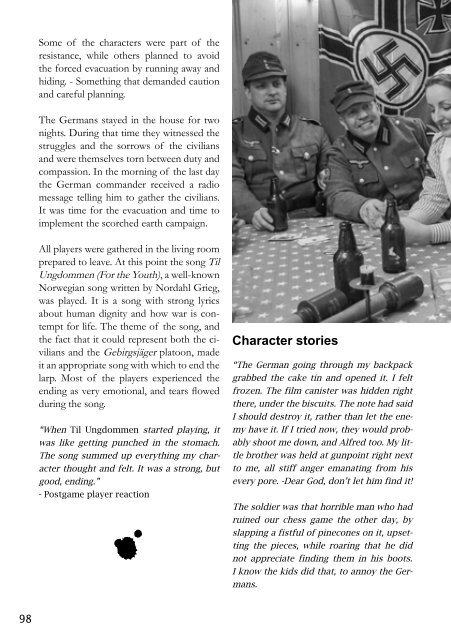nordiclarpyearbook2015
nordiclarpyearbook2015
nordiclarpyearbook2015
Create successful ePaper yourself
Turn your PDF publications into a flip-book with our unique Google optimized e-Paper software.
Some of the characters were part of the<br />
resistance, while others planned to avoid<br />
the forced evacuation by running away and<br />
hiding. - Something that demanded caution<br />
and careful planning.<br />
The Germans stayed in the house for two<br />
nights. During that time they witnessed the<br />
struggles and the sorrows of the civilians<br />
and were themselves torn between duty and<br />
compassion. In the morning of the last day<br />
the German commander received a radio<br />
message telling him to gather the civilians.<br />
It was time for the evacuation and time to<br />
implement the scorched earth campaign.<br />
All players were gathered in the living room<br />
prepared to leave. At this point the song Til<br />
Ungdommen (For the Youth), a well-known<br />
Norwegian song written by Nordahl Grieg,<br />
was played. It is a song with strong lyrics<br />
about human dignity and how war is contempt<br />
for life. The theme of the song, and<br />
the fact that it could represent both the civilians<br />
and the Gebirgsjäger platoon, made<br />
it an appropriate song with which to end the<br />
larp. Most of the players experienced the<br />
ending as very emotional, and tears flowed<br />
during the song.<br />
“When Til Ungdommen started playing, it<br />
was like getting punched in the stomach.<br />
The song summed up everything my character<br />
thought and felt. It was a strong, but<br />
good, ending.”<br />
- Postgame player reaction<br />
ø<br />
Character stories<br />
“The German going through my backpack<br />
grabbed the cake tin and opened it. I felt<br />
frozen. The film canister was hidden right<br />
there, under the biscuits. The note had said<br />
I should destroy it, rather than let the enemy<br />
have it. If I tried now, they would probably<br />
shoot me down, and Alfred too. My little<br />
brother was held at gunpoint right next<br />
to me, all stiff anger emanating from his<br />
every pore. -Dear God, don’t let him find it!<br />
The soldier was that horrible man who had<br />
ruined our chess game the other day, by<br />
slapping a fistful of pinecones on it, upsetting<br />
the pieces, while roaring that he did<br />
not appreciate finding them in his boots.<br />
I know the kids did that, to annoy the Germans.<br />
He was one of the two scary ones. The other<br />
was totally unpredictable; small, wiry, always<br />
sneaking, leering- and quick to anger;<br />
like when he suddenly cut Pernille’s long,<br />
beautiful braid clean off with his knife, just<br />
because the young girl had put a paper clip<br />
in it. This one was frightening in a way of<br />
potential violence contained; one could almost<br />
sense ill deeds, past and future, slipping<br />
through the cracks of his personality.<br />
He thoroughly stirred around the biscuits,<br />
then his brow tensed... and I knew he had<br />
found it.”<br />
- Memories of Johanne Hildoen, Norwegian<br />
civilian<br />
t<br />
Germans playing cards.<br />
(Photo: Hanne Eik Pilskog)<br />
“My German Gebirgsjäger platoon made a<br />
fighting retreat from the east front. We arrived<br />
in Tana and were ordered to take part<br />
in the evacuation and burning of the area.<br />
I saw the individuals of my unit being on<br />
the brink of breakdown, but we managed<br />
somehow.<br />
During the stay at the Elilla farm I was<br />
standing outside, looking at the children<br />
playing around and having fun, and it hit<br />
me that I would soon have to forcefully<br />
evacuate these children and send them out<br />
on an uncertain march. I would take away<br />
all the fun they had and ruin their childhood.<br />
It was not easy to balance the feelings<br />
of compassion and the importance of<br />
showing authority. During one lunch, my<br />
group had settled at what appeared to be<br />
the Elillas’ regular table. The situation became<br />
tense when the matron said that no<br />
one would eat before they got their table<br />
back. I saw the room full of hungry refugees<br />
waiting for the outcome, but I could<br />
not back down. We did, however, not use<br />
that table again.<br />
The last evening the priest’s pregnant wife<br />
fell in the stairs. We offered our medical<br />
assistance, but we could not help and she<br />
had a miscarriage. I had to bury the baby in<br />
the forest. The next day I led the minister<br />
and his wife to the site, where they had a<br />
little ceremony of their own. I stood there<br />
in tears.”<br />
- Memories of Lieutenant Claus Schröner,<br />
German officer<br />
e<br />
98 99


